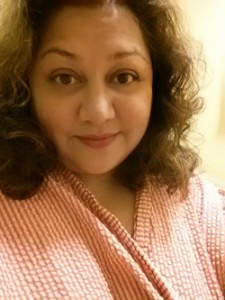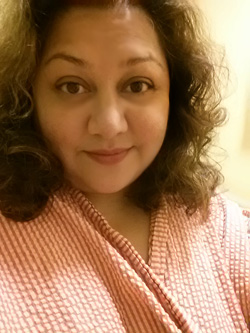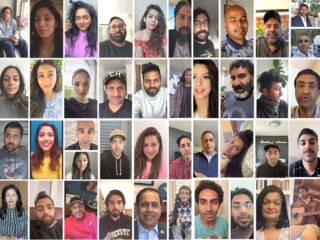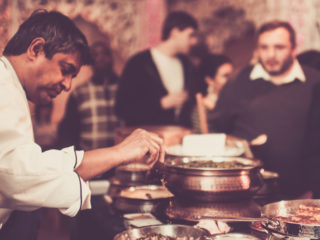
by Ayesha Hakki
August 22, 2014: The thing about being diagnosed with cancer is that you suddenly start scrutinizing every part of your lifestyle with eagle-eyed suspicion. Perhaps it was that emergency stash of chocolate truffles I have hidden in my fridge, maybe it’s that expensive, divinely scented body lotion that I love so much or could it be the dollar store-strong household cleansers I use to keep my apartment clean. I don’t know and neither, it appears, does anyone else.
I wish I could pinpoint it to one thing that I could cut out of my life and know that yes, this was the reason I developed breast cancer… but it’s not that clear cut. Obviously there are certain steps you take once you are diagnosed. In my case, it was exactly as follows:
Step One: Breathe.
Step Two: Panic. Hyperventilate.
Step Three: Cry. Drown in self-pity.
Step Four: Breathe again. Take action.
With a big black garbage bag tucked under my arm, I first besieged my kitchen ridding it of any BPA-infested plastic. Relentlessly, I threw away every offending plastic takeout container, bottle, spoon and jar. Next, I confronted my bathroom closet chucking half full bottles of paraben and sulfate-laden shampoo, conditioner, body lotions, deodorants and washes. I showed no mercy at the overtly chemical bathroom cleansers, the streak-free glass cleaners and the Fresh Rain-scented air freshener. All of this can be replaced. It was only when I opened the vanity cabinet that my own vanity stared back at me with defiance.
Was I really ready to dispose of that miracle of miraculous facial care system—eye, day, night and rejuvenating mask? Was this a boundary I dare cross? With a heavy sigh, I turned to my makeup drawer and ran my fingers gingerly over my lipstick collection: Powersuit Red, Flirty & Fabulous Pink, Cool Coral. My eyeshadows peaked out from inside their makeup bag cover and quietly blinked at me in innocence. My perfumes stood still hoping to go unnoticed.
I couldn’t go that far, I wasn’t ready to sacrifice my friends. Not yet. Like any meaningful relationship, small, gradual adjustments would eventually lead to a comfortable change. Cancer or not, I was willing to take that chance. After all, isn’t a positive mental state part of the combat?
With a feeling of confusion and resignation common at the end of any war, I dragged the straining garbage bag to the trash bins outside my apartment and a subway ride later, found myself wandering the aisles of my closest Whole Foods. With battle-worn eyes wide in surrender, I navigated the shelves looking for products that I could now safely use. I crosschecked labels, ingredients, instructions and the (OMG!) steep price tags, until I could make peace with products that met my needs.
About $150 later, I returned home with a plethora of new organic beauty products, glass food containers, a spattering of organic vegetables and a PFOA and PTFE-free ceramic pan. A new era had begun.
If there’s anything that I am learning about the lifestyle change that cancer insists upon is that we as a society have become so accustomed to convenience, that we have blindly accepted anything that is put in front of us, especially if it is marketed well and on sale.
Certain beauty companies create massive amount of product and in order to make it last, infuse it with a group of chemicals called parabens. Parabens are found in cosmetics, pharmaceuticals, food and, of course, biopsy samples of breast cancer. Check the ingredients, if a word ends with “paraben,” whoomp! …there it is. There are many paraben-free products available, and with the ease of online shopping, accessible.
Let me also introduce paraben’s lovely cousin, BPA. BPA or bisphenol A is one of the most prevalent chemicals to which we are exposed to in everyday life. It is often found in plastic and epoxy resins used in many common consumer products. The most surprising BPA offenders, however, are the thermal receipts we are handed every time we make a purchase—a particularly ironic thing when it happens at an organic shop. It’s in the air, the food we eat, the water we drink, and of course, the US is one of the worst producers of this chemical, dumping 500 tons of it into the environment annually.
Last but not least to the party, meet PFOA (Perfluorooactanoic Acid) and PTFE (Polytetrafluoroethylene), a charming couple that can be found in most non-stick cookware and is known to be detrimental to human health.
It’s no wonder cancer is on the rise globally and the US ranks number 6 as the country with the most cancer cases. There are steps we can all take to ensure our own health. I suggest doing some research and ridding your daily life of as many chemicals as you possibly can. It may not be convenient or cheap for that matter, but it is worth it.
Trust me. It’s definitely worth it.










